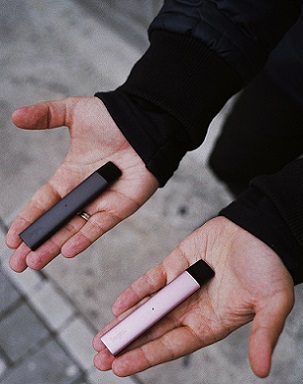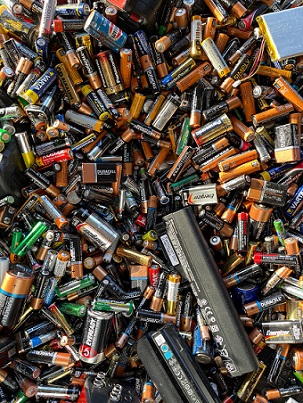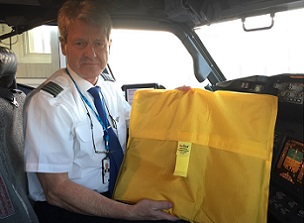 Vapes. Photo by Olena Bohovyk on Pexels.
Vapes. Photo by Olena Bohovyk on Pexels.
 Far too many lithium batteries are being thrown into household waste rather than being recycled. Photo by John Cameron on Unsplash.
Far too many lithium batteries are being thrown into household waste rather than being recycled. Photo by John Cameron on Unsplash.
 A pilot with an AvSax lithium battery fire mitigation bag
A pilot with an AvSax lithium battery fire mitigation bag
Around 1.3 million single use vapes are thrown away each WEEK in the UK … yet every single one should be recycled.
They are disposable ones which means people are simply disposing of them in household waste or even just littering rather than returning them to where they bought them from for recycling.
It means the lithium batteries inside the vapes are crushed during the recycling process and can easily cause huge fires as they are surrounded by highly combustible material.
Earlier this month 40 London firefighters tackled a huge fire involving 100 tonnes of household recycling at a waste disposal site in Wandsworth. The fire is thought to have been started by a lithium battery.
To prevent these kind of fires some recycling companies are now looking to harness the kind of technology used by airline companies to deal with lithium battery fires on passenger aircraft. More than 16,500 aircraft now have AvSax lithium battery fire mitigation bags on board to deal with a fire at 30,000ft and the company behind this award-winning technology – Environmental Defence Systems Ltd based in Huddersfield, West Yorkshire – is now researching into using it to prevent fires in recycling centres.
The disposable vapes research was carried out on behalf of Material Focus which campaigns for more electrical recycling and says that, apart from the fire danger, simply throwing all these vapes away means valuable metals such as lithium and copper are needlessly lost forever when they could be recycled.
The amount of lithium in the 138 million disposable vapes sold in the UK every year would be enough to provide the lithium in the batteries for more than 2,500 electric vehicles.
And the copper in them would be sufficient to power more than 370,000 home electric vehicle charging stations.
Material Focus stresses that vape sellers must take back used disposable vapes for recycling although it’s suspected that many don’t.
Analysis by Material Focus reveals that just 16 out of 150 vape and vape juice producers in the UK had registered to comply with environmental regulations for producer responsibility for waste electricals, portable batteries, and packaging – basically contributing to the costs of recycling the products. If all 138 million disposable single use vapes were recycled properly, as they should be, it would cost the producers £69m a year.
Material Focus executive director Scott Butler said: “Disposable single use vapes are a quadruple environmental threat – losing critical raw materials, the impact of hazardous waste, fire risk and the loss of plastics.
“The environmental responsibilities of vape producers are very clear. Any company that is producing significant quantities of electrical items is required to register, report their sales and finance the cost of their product being recycled. Retailers are also responsible for ensuring that it’s easy for their customers to recycle these products by providing recycling drop off points in their stores.
“It is shocking that it seems that the majority of the smaller vape producers in the UK aren’t complying with these long-standing environmental regulations. And for those larger producers that have only recently registered, they need to bear the full costs of collecting and recycling these complex to recycle products which may mean paying significantly higher fees than they are currently paying.
“As sales and profits have boomed, the environmental impacts and costs of collecting and recycling waste vapes have been disregarded.
“We are calling on disposable single use vape consumers to put pressure on retailers to make it possible for them to drop off their vapes in store. Vape producers, importers and retailers need to be held to account and step up to the plate by making sure we do not lose the precious materials contained inside these vapes.”
Lithium batteries wrongly thrown into household rubbish are thought to cause around 700 fires a year in UK recycling centres or waste disposal lorries.
For more information on how to recycle vapes and to find your nearest recycling point go to https://www.recycleyoureletricals.org.uk/
For more information on AvSax go to http://www.avsax.com/